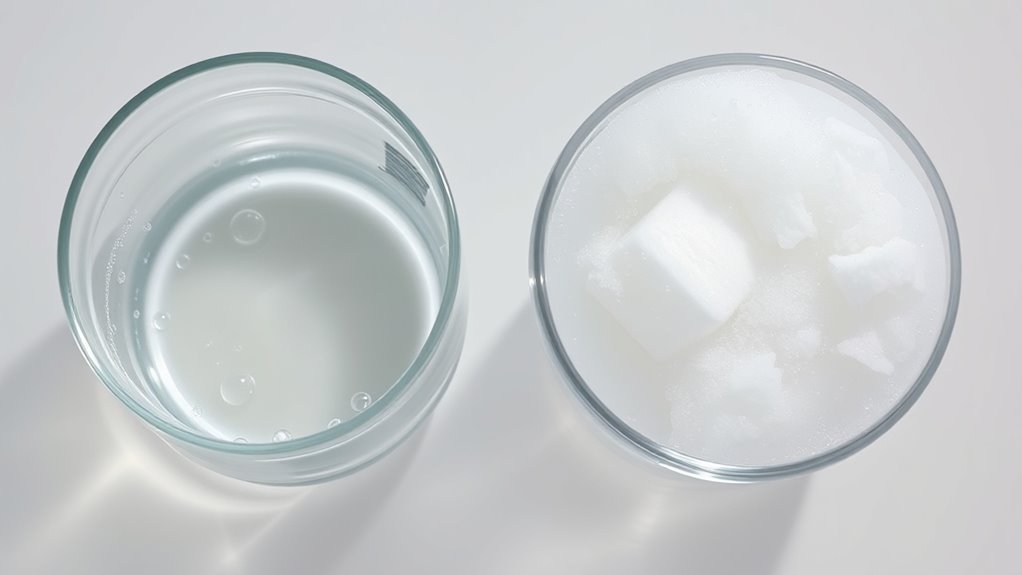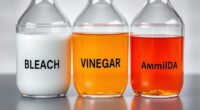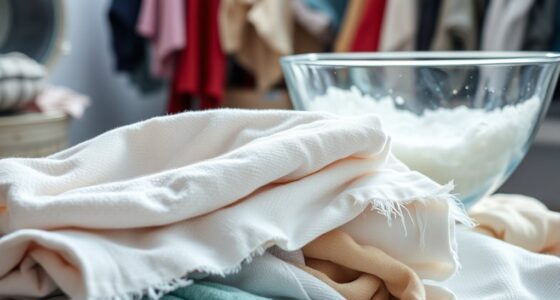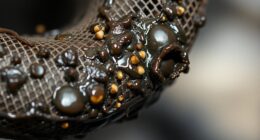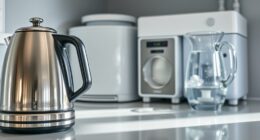Vinegar works by dissolving mineral deposits, soap scum, and grease through its acidity, making it great for mineral buildup and surface disinfection. Baking soda, on the other hand, acts as a gentle abrasive to clean surfaces physically and neutralizes odors chemically. Each cleaner tackles different messes: vinegar for mineral and soap residues, baking soda for scrubbing and deodorizing. To learn more about how they work together, keep exploring their specific uses and safety tips.
Key Takeaways
- Vinegar’s acidity dissolves mineral deposits, soap scum, and grease, acting as a natural disinfectant.
- Baking soda’s abrasive texture scrubs surfaces and neutralizes odors through chemical reactions.
- Vinegar effectively kills bacteria and mold, while baking soda absorbs moisture and odors.
- Vinegar is best for mineral buildup and soap scum removal; baking soda excels at deodorizing and gentle scrubbing.
- Combining both enhances cleaning by leveraging vinegar’s dissolving power and baking soda’s abrasive and deodorizing properties.
The Chemical Composition of Vinegar and Its Cleaning Power
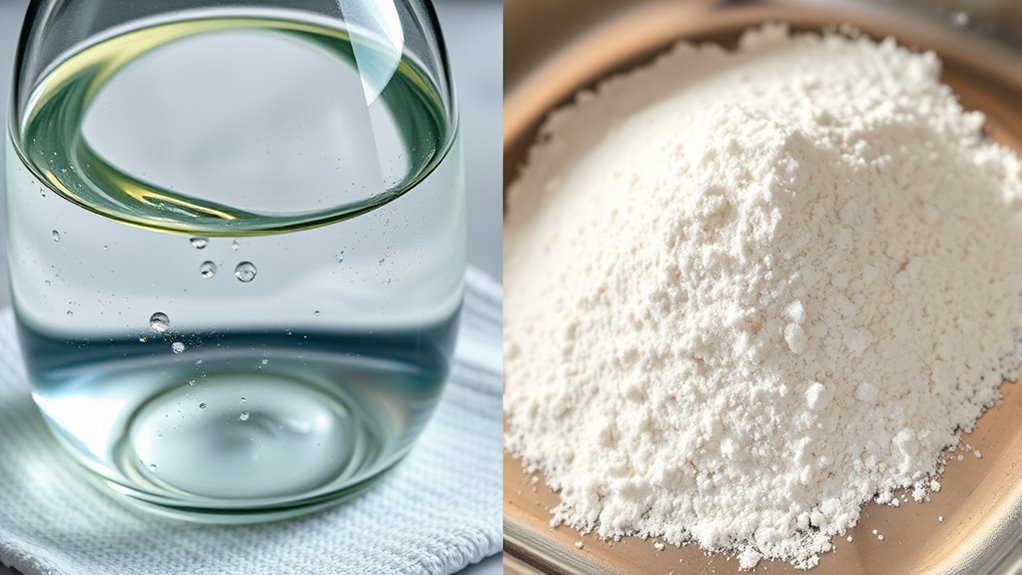
Vinegar’s main active component is acetic acid, typically making up about 5-8% of its volume. This acetic acid influences its pH level impact, making vinegar mildly acidic with a pH around 2.5. This acidity helps break down mineral deposits, grease, and grime effectively. Its organic compound content, primarily acetic acid and water, contributes to its natural cleaning power without harsh chemicals. The low pH level allows vinegar to neutralize alkaline substances, making it versatile for cleaning tasks. Because of its organic composition, vinegar is safe, biodegradable, and environmentally friendly. Its acidity also helps inhibit bacteria and mold growth, enhancing its disinfectant qualities. Understanding the chemical makeup reveals why vinegar is a popular, natural cleaning agent and how its chemical composition underpins its effectiveness.
How Baking Soda Works as a Natural Abrasive and Deodorizer
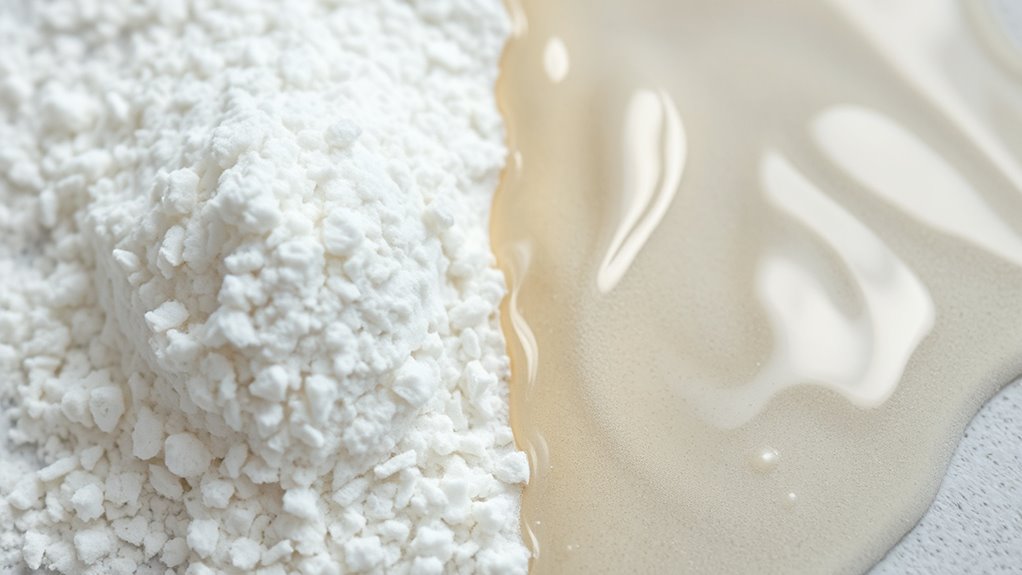
Baking soda’s gentle abrasiveness helps you scrub away dirt without scratching surfaces. It also acts as a natural deodorizer, neutralizing stubborn odors instead of just masking them. Together, these qualities make baking soda a versatile tool for cleaning and freshening your space. Additionally, its ability to absorb moisture can help prevent mold and mildew growth in damp areas. Moisture absorption enhances its effectiveness in maintaining a clean and fresh environment.
Gentle Scrubbing Power
Because of its fine, granular texture, baking soda acts as a gentle abrasive that can scrub away dirt and stains without scratching surfaces. Its neutral pH levels make it safe for most materials, helping to break down grime without causing damage. When you use baking soda, you’re leveraging its residue removal capabilities, as it lifts and dissolves stubborn dirt. This mild abrasive quality allows you to scrub surfaces effectively while avoiding harsh scratches. Plus, its natural deodorizing properties help eliminate lingering odors. Baking soda’s gentle scrubbing power makes it ideal for cleaning delicate surfaces like countertops, sinks, and appliances, giving you a versatile, eco-friendly option that’s both effective and safe for everyday use. AI safety measures are important to ensure the responsible use of cleaning agents and other household technologies.
Odor Neutralization Skills
One of baking soda’s most impressive skills is its ability to neutralize odors effectively. It works by absorbing unwanted smells, providing fragrance masking that leaves your space fresh. Baking soda’s alkaline nature helps suppress microbial activity, reducing bacteria that cause persistent odors. This microbial suppression prevents odors from lingering and multiplying. You can sprinkle it on carpets, upholstery, or trash cans to eliminate smells at their source. Unlike fragrances that temporarily mask odors, baking soda chemically neutralizes them. Its gentle abrasive qualities also help remove odor-causing residues from surfaces. For best results, let it sit for a few hours or overnight before vacuuming or wiping away. This natural deodorizer is safe, affordable, and versatile, making it an excellent choice for maintaining a fresh and odor-free environment. Additionally, understanding the preppy dog names can inspire a charming and sophisticated vibe that complements your pet’s personality.
Vinegar’s Role in Breaking Down Mineral Buildup and Soap Scum
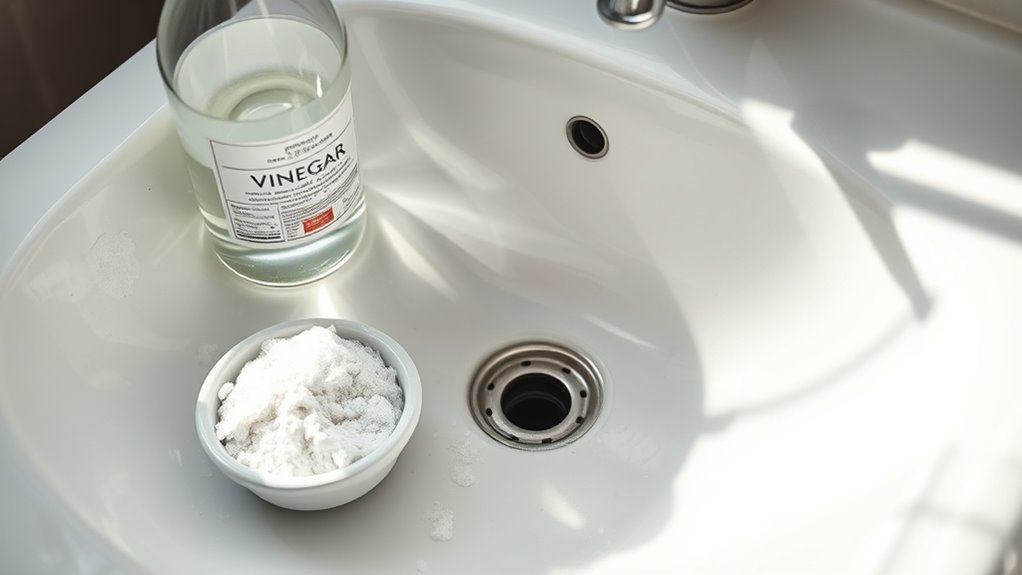
Vinegar is highly effective at breaking down mineral buildup and soap scum because of its acidic nature. Its low pH level impacts mineral deposit dissolution by neutralizing alkaline residues that cause buildup. When you apply vinegar, the acidity penetrates the surface, loosening mineral deposits like calcium and lime scale. This pH level impact makes vinegar particularly good at dissolving stubborn soap scum that accumulates in bathrooms and kitchens. As the acid reacts with these deposits, it transforms solid mineral deposits into soluble compounds, making them easier to wipe away. Regular use of vinegar can prevent the buildup from becoming too thick or hardened. Overall, vinegar’s acidity is a natural, chemical-free way to maintain surfaces free of mineral and soap scum deposits.
The Mechanical Action of Baking Soda in Scrubbing and Stain Removal
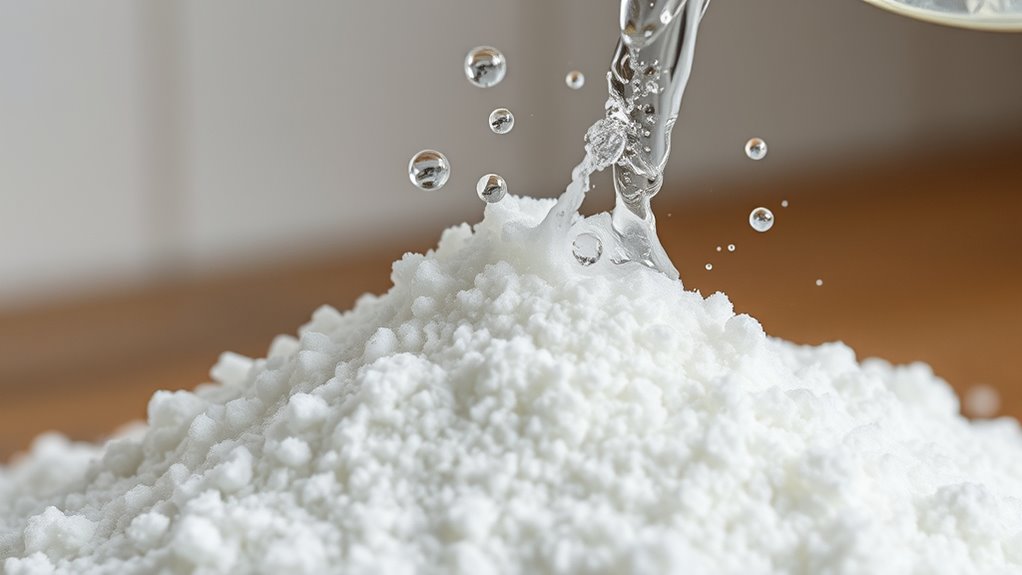
Baking soda’s abrasive quality makes it a powerful tool for scrubbing surfaces and removing stains. Its gritty texture provides industrial strength scrubbing power while remaining eco friendly, making it ideal for various household tasks. When you use baking soda to scrub, you harness its ability to physically lift dirt, grime, and stains from surfaces like sinks, countertops, and tiles. This mechanical action breaks down stubborn residues without harsh chemicals, ensuring a gentle yet effective clean. The gentle abrasiveness helps dislodge particles without scratching delicate surfaces. Because it’s a safe, natural substance, baking soda offers a sustainable cleaning option that’s tough on stains but safe for your family and the environment. This makes it a versatile choice for eco friendly solutions around your home. Personal and community resilience are further supported by understanding how natural cleaning agents like baking soda can contribute to a safer, more prepared household environment.
When to Use Vinegar Versus Baking Soda for Household Cleaning Tasks
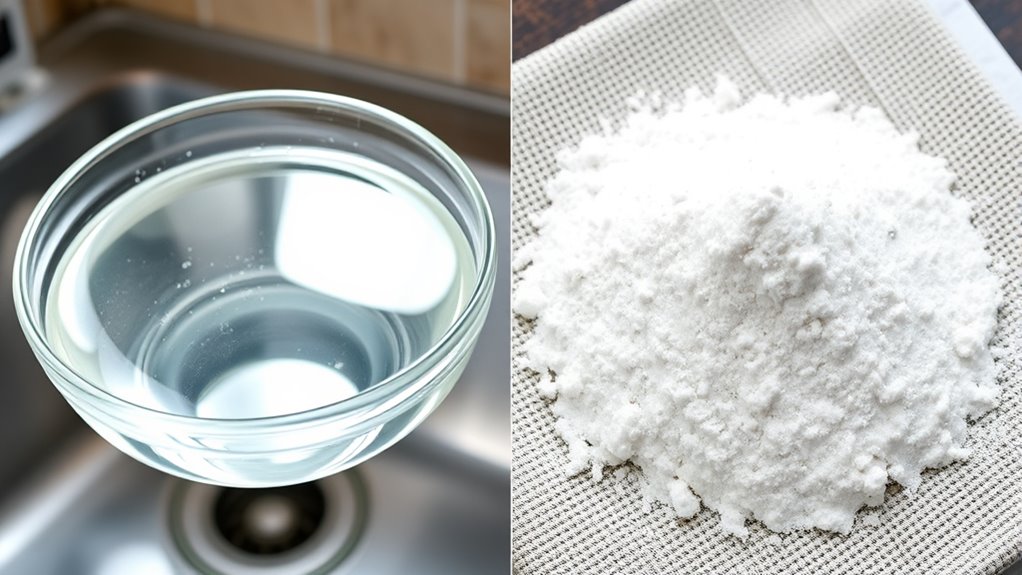
Choosing between vinegar and baking soda depends on the specific cleaning task at hand. For eco-friendly alternatives that tackle grime and odors, vinegar works best for removing mineral deposits, soap scum, and disinfecting surfaces. Use vinegar when you need a natural disinfectant or to cut through grease. Baking soda excels at deodorizing, gentle scrubbing, and lifting stains. It’s ideal for cleaning sinks, countertops, and refrigerators. When comparing costs, baking soda is typically more affordable per use, making it a budget-friendly option for routine cleaning. Vinegar, while slightly more expensive, offers versatility as a natural cleaner and disinfectant. Knowing the strengths of each allows you to choose the most effective and eco-conscious solution for your specific household cleaning needs. Additionally, understanding the essential oils that support health and wellness can help you create a cleaner, more relaxing environment in your home.
Safety Tips and Best Practices for Using Vinegar and Baking Soda Effectively
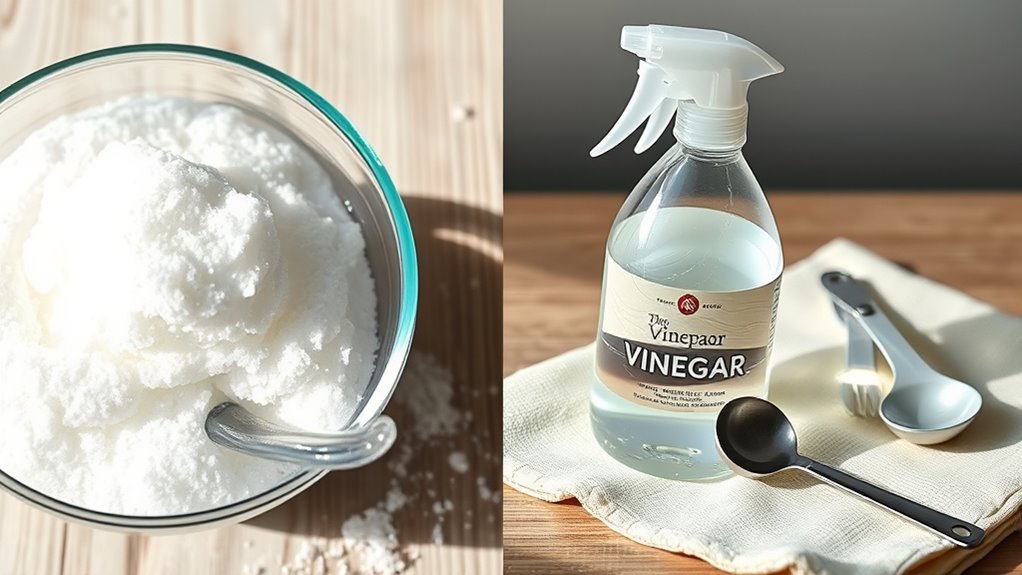
Using vinegar and baking soda safely guarantees you get the most effective results without risking damage or harm. Always store these substances properly to prevent spills or accidental contact. Keep vinegar in a cool, labeled container away from children and pets, and store baking soda in a sealed container in a dry place. Personal protection is essential—wear gloves and eye protection when handling concentrated solutions to avoid irritation. Before mixing, test small areas to prevent unexpected reactions. Follow this table for best practices:
| Proper Storage | Personal Protection | Usage Tips |
|---|---|---|
| Keep in labeled containers | Wear gloves and goggles | Mix in well-ventilated areas |
| Store away from heat | Wash hands after use | Use appropriate amounts |
| Keep out of reach of children | Avoid inhalation of fumes | Rinse surfaces thoroughly |
These steps ensure safe, effective cleaning. Additionally, always consider proper ventilation to prevent inhaling fumes during cleaning processes.
Frequently Asked Questions
Can Vinegar and Baking Soda Be Combined Safely for Cleaning?
You can combine vinegar and baking soda for cleaning, but do it carefully. When mixed, they create a chemical reaction that produces carbon dioxide bubbles, which can enhance cleaning effectiveness by loosening dirt and grime. However, avoid storing the mixture for long periods, as the reaction neutralizes the cleaning power. Use it promptly for best results, ensuring a safe and effective cleaning process that leverages the natural power of both ingredients.
Are There Surfaces That Should Avoid Vinegar or Baking Soda?
Did you know that over 60% of homeowners avoid damaging their surfaces? You should steer clear of vinegar on delicate surfaces and natural stone, as its acidity can cause etching or discoloration. Baking soda, though gentle, might scratch softer surfaces. Always test in a small area first, and use appropriate cleaners for each surface type to keep your home safe and spotless.
How Long Should Vinegar or Baking Soda Sit on a Stain?
You should let vinegar or baking soda sit on a stain for about 5 to 15 minutes, depending on the severity. For effective stain removal, apply the cleaner and monitor the application timing, ensuring it doesn’t sit too long on delicate surfaces. Baking soda can be left longer for tougher stains, while vinegar’s application timing should be shorter to prevent damage. Always test first and adjust the stain removal duration accordingly.
Do Vinegar and Baking Soda Leave Any Harmful Residues?
You’ll find that vinegar and baking soda leave minimal harmful residues, making them safe for your home. Vinegar evaporates quickly, leaving no toxic traces behind, while baking soda dissolves into tiny particles that are easy to rinse away. Their residue safety and environmental impact are low, so you can clean with confidence, knowing you’re not polluting your space or harming the planet. Imagine a fresh, clean surface without lingering chemical worries.
How Do I Store Vinegar and Baking Soda for Long-Term Use?
To store vinegar and baking soda for long-term use, keep vinegar in a cool, dark place in a sealed container to preserve its potency and extend its shelf life. Store baking soda in an airtight container away from moisture to prevent clumping. Follow these storage tips to ensure both cleaners stay effective over time, so you can use them whenever needed without worry about spoilage or reduced cleaning power.
Conclusion
Now that you know what vinegar and baking soda do, you might wonder if combining them creates a super cleaner. While some say it boosts cleaning power, science shows it actually neutralizes their effects. Instead, use each separately for specific tasks—vinegar for mineral deposits, baking soda for scrubbing. By understanding their true powers, you’ll clean smarter, not harder. Who knew simple pantry staples could be so scientifically fascinating?
